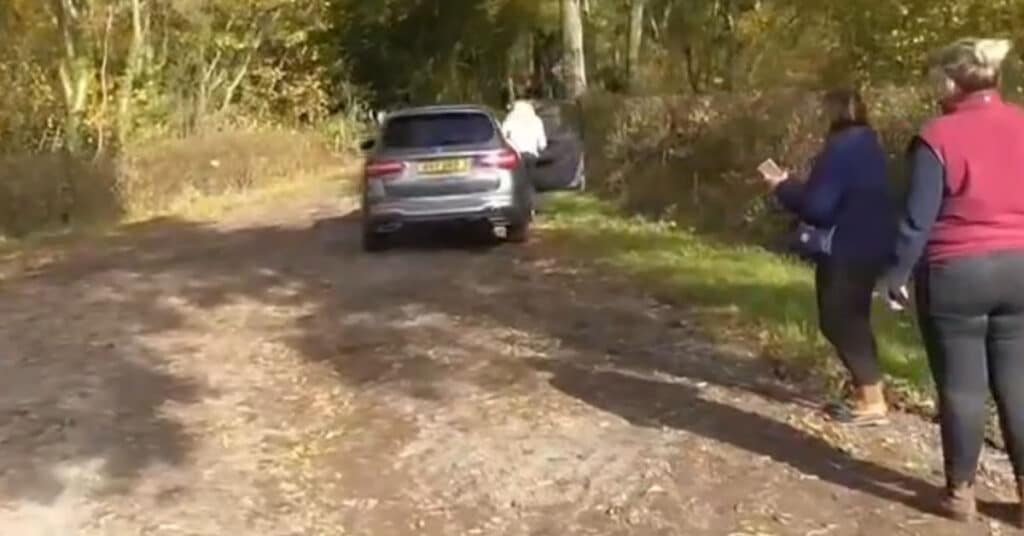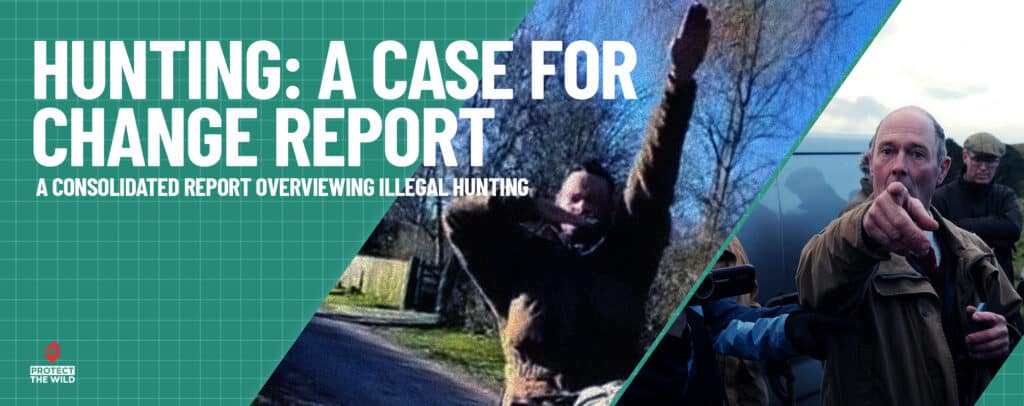Protect the Wild recently published “Hunting: A Case for Change“, a 50-page report that offers a thorough examination of hunting practices during the 2022/23 season. The report focuses predominantly on fox, hare, and deer hunting in England and Wales.
Author Glen Black utilised a combination of online data from anti-hunting groups, public reports, and activist observations to evaluate the prevalence and impact of hunting on wildlife, communities, and individuals.
“Hunting: A Case for Change” underscores persistent violations and the far-reaching implications on wildlife populations, local communities, and the wider general public, which we are now looking at in a series of posts.
HUNT VIOLENCE
The 2022/23 hunting season (not including summer mink and otter hunting) gave rise to some of the most serious hunt violence seen in recent years. However, it wasn’t just serious violence that anti-hunting activists faced. Protect the Wild’s research into hit reports by hunt saboteur and monitor groups, as well as social media posts by the general public, showed that low-level violence was commonplace and rife across England and Wales.
There were, in total, 211 publicly reported incidents of people connected to hunts carrying out attacks on sabs and monitors. A majority of these – 198 – were of a type that Protect the Wild categorised as ‘minor’ attacks. This was a broad category and included everything from pushing and shoving to harmful language (racism, sexism, etc) and also included attacks on vehicles where people weren’t seriously endangered. It did not include swearing, horses ‘used as a weapon’ unless they hurt someone, or cars and quads driven close to but not hitting people. A ‘major’ attack was anything that caused serious harm to humans including attacks with weapons, trampling by horses, and being hit by vehicles.
For further details on how the data was gathered, please read Protect the Wild’s Hunting: A Case for Change report, where there is much finer detail.
For now, it is enough to say that each incident may have involved more than one person, and there are likely many incidents that go unreported altogether. As such, the 211 figure is only the tip of the iceberg.
Hit-and-run
Protect the Wild went through a total of 2133 reports for the 2022/23 season, which means that approximately 10% of all hunt meets reported on by activists involved some sort of attack. This wasn’t evenly spread, though. Unsurprisingly, if a hunt and its followers are given to violence, then they’re more likely to carry it out. This is seen in the figures, with ‘repeat offenders’ cropping up again and again.
Five hunts had more than 10 reports of minor attacks made about them:
- Puckeridge Hunt: 15
- Blackmore and Sparkford Vale Hunt: 11
- Cottesmore Hunt: 11
- South Dorset Hunt: 11
- Warwickshire Hunt: 11
Three of these were also connected with incidents of serious violence: Cottesmore Hunt, Puckeridge Hunt, and South Dorset Hunt.

The most high profile of these was undoubtedly the hit-and-run car attack by a follower of the Cottesmore Hunt on a member of Northants Hunt Saboteurs. The attack took place on 25 October 2022 and was captured on multiple cameras. That same meet also recorded two incidents of (slightly) less serious violence. Terrierman Gary McCann in one incident attacked and smashed a camera, and in another tried to force entry into a sab group’s vehicle. Both of these occurred after the hit-and-run.
However, as Protect the Wild previously outlined, these weren’t random one-offs but another in a long history of aggressive and violent behavior. Nor did the incident bring an end to violence by the hunt and its followers. Northants Hunt Saboteurs and Hertfordshire Hunt Saboteurs continued reporting violence from the hunt throughout the rest of the season, while the former has continued to report violence throughout the most recent season.
Robbery, catapults, and even a forklift
In the case of the Puckeridge Hunt, the major incident occurred on 12 November 2022. East Northants Hunt Saboteurs said at the time that:
Two sabs were using a hunting horn to call off the hounds when they were viciously attacked by five men, including the aforementioned Arun Squire and his Whipper-in. Both sabs received blows to the head, one was struck hard on the shoulder by the hunstman Paul Davies using a whip handle, and the other was pushed to the ground as they tried to steal his chest camera. The thugs also stole the hunting horn and citronella sprays, hoping to put these effective sabs out of action.
This incident illustrated not only a coordinated group attack but also attempted robbery to prevent evidence from reaching the police or the public.

The South Dorset Hunt’s two incidents of serious violence occurred less than a month apart, the first of which bore many similarities to the Puckeridge Hunt attack. On 20 December 2022, two unidentified men attacked a monitor during a meet at Mappowder. They jumped the 77-year-old monitor from behind with a metal bar, robbed him of his body camera, and then disappeared. On 12 January 2023, someone used a catapult to shoot a ball bearing at a monitor during a meet of the hunt at Galton Heath. Two dead foxes were also laid outside the house of a member of Weymouth Animal Rights sab group the following morning.
Other hunts reportedly connected with major attacks during the 2022/23 season were:
- Derwent Hunt – A supporter (possibly terrierman) headbutted a member of East Coast Yorkshire Hunt Sabs on 24 December 2022
- Eggesford Hunt – A terrierman drives his quad into the back of a member of Devon County Hunt Saboteurs at speed on 26 December 2022
- Hursley and Hambledon Hunt – A supporter drives her forklift into the side of West Sussex Hunt Saboteur’s vehicle with people inside on 14 January 2023
- Pytchley with Woodland Hunt – Known hunt thug repeatedly punched a member of North London Hunt Saboteurs in the head on 18 March 2023
- Sennybridge Farmers Hunt – Multiple supporters beat up and robbed two members of South Wales Hunt Saboteurs on 11 February 2023
- West Norfolk Foxhounds – A supporter repeatedly punched then robbed a member of Norfolk/Suffolk Hunt Saboteurs on 26 November 2022
- Worcestershire Hunt – Terriermen punched a disabled man who was observing the hunt to the floor then robbed him of his walking stick on 1 February 2023
Except for Angela Jarrom, who was driving the hit-and-run car, none of the perpetrators were caught or faced legal repercussions.

Widespread and endemic
Whilst the incidents of serious violence are worth noting individually, the sheer number of attacks of a less serious nature is a point worth noting of its own.
In total, 57 different hunts were associated with minor attacks. With data for Protect the Wild’s report collected from 78 different hunts in total, that means 73% of all observed hunts were connected with intentionally harmful actions. These covered the length and breadth of England and Wales, suggesting that it’s not just a few isolated hunts carrying out these attacks. Instead, it appears that aggression and violence are endemic within the hunting industry.
Moreover, as the Cottesmore Hunt’s history of violence shows, minor attacks have the very real possibility of building into much more serious violence. With so many hunts connected to some degree of aggression and harm, the potential for it to explode exists nearly everywhere.
Most importantly, it’s essential to remember that this harm is carried out to protect an activity that’s not only ethically bankrupt but actively illegal. Attacks are targeted at compassionate people seeking to help wildlife escape and, essentially, are ensuring others are abiding by the law.
-
None of this would happen if hunts weren’t continuing to pursue and murder foxes, hares and deer. Anti-hunting direct action won’t stop until the hunting industry is gone, so the sooner an actually effective law is introduced the better.
SPECIAL ACKNOWLEDGEMENT
“Hunting: A Case for Change” couldn’t have been written without the courageous monitors and saboteurs out in the field standing up to the hunts. Their tireless work throughout the hunting season and their dedication in writing reports on their experiences continues to be absolutely vital. Without direct action the public cannot be shown what really goes on in the British countryside. To thank the brave sabs and monitors who witnessed all of this first hand, please consider supporting your local hunt saboteur or monitor group.
- Download ‘Hunting: A Case for Change’ as a pdf.

